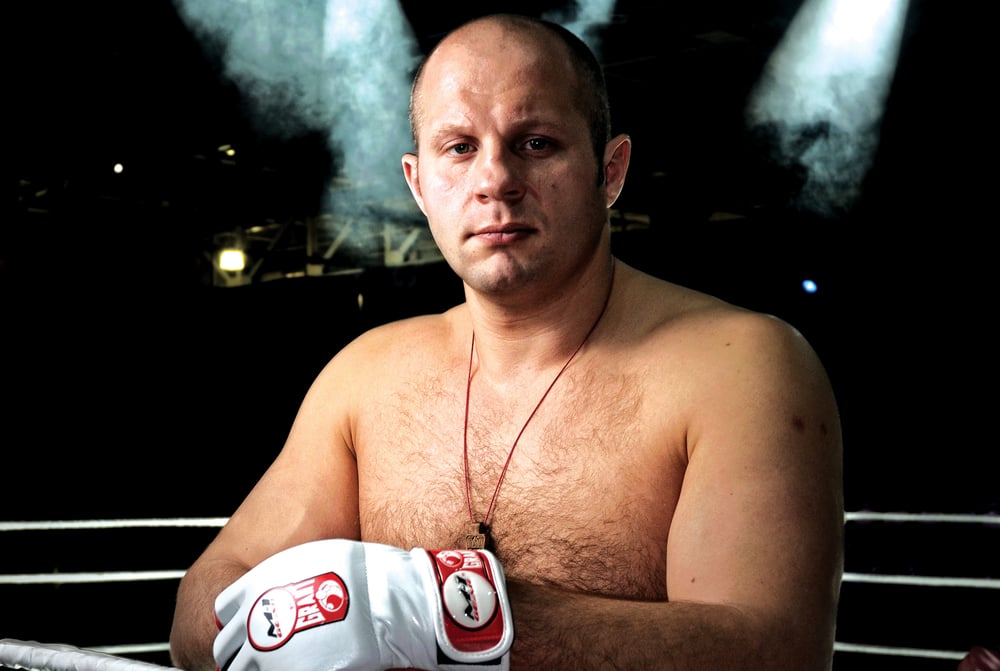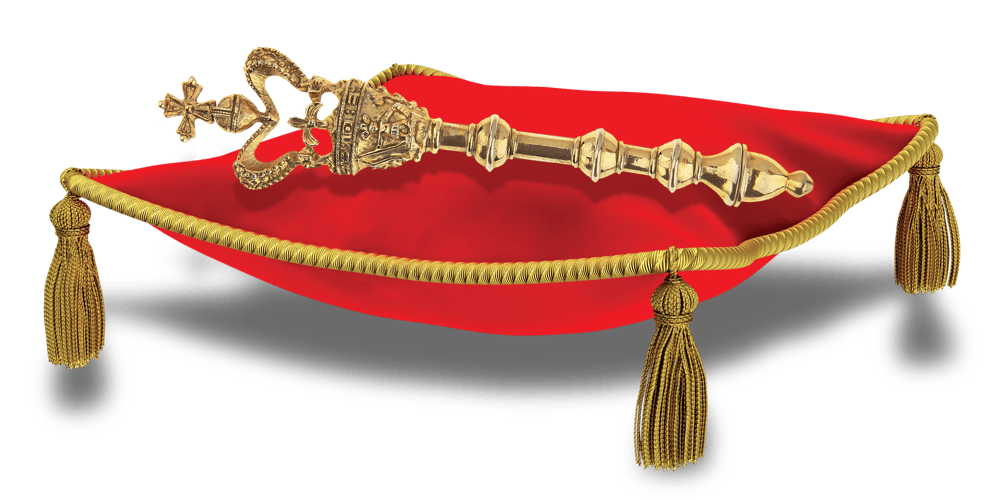
Issue 156
July 2017
Now more than ever, there is a legitimate debate about the identity of MMA’s greatest ever heavyweight. Does ‘The Last Emperor’ still boast that title in 2017?
In all likelihood, Fedor Emelianenko doesn’t care much for greatness, nor does he spare a thought for being called the greatest heavyweight of all-time. Were the debate put to him, it would be one he ducks – like UFC champions, the critics yell – and would most likely be greeted by the same shrug and look of insouciance that spooked and unsettled many of the opponents who now front the ‘Fedor is the greatest’ campaign trail on his behalf.
Nonplussed, his soft, welcoming eyes would tell you his record speaks for itself and that for anyone to even argue the point is a reflection not on his résumé, but instead the extent to which MMA remains a UFC-dominated landscape. He will then look down at the floor and smile not at you, but to himself. It’s at that point, like every one of his victims, you’d wonder exactly what it is he’s thinking.
The true greats rarely overstate – or even feel the need to quantify – their greatness. Fans, on the other hand, love nothing more than to establish a hierarchy and then discuss it ad nauseam. They are, after all, the ones who know best; the ones who shout the loudest; the ultimate barometer of a fighter’s greatness – or lack thereof.

Few divide opinion or spark debate quite like Fedor. His advocates are staunch and utterly convinced of the man’s greatness, while detractors offer a contrary opinion with just as much passion and righteous indignation. His greatness, you see, is a greatness with caveats and question marks. There are gray areas. Decision split, rather than unanimous, the 40-year-old’s career is one studied and scrutinized like no other. To some, the work of the greatest heavyweight to walk the planet. To others, a masterpiece with blemishes and holes.
Let’s start with the holes. No UFC win to his name, much less a championship, is judged by some as a black mark on an otherwise stellar set of credentials. It’s a sign he avoided the toughest tests of his era, instead deciding to create a second-tier heavyweight legacy, which centered around defeating a number of older veterans and building momentum via the ultimately fanciful notion that he would one day compete in the UFC.
We afforded Fedor mismatches against the likes of Matt Lindland and Choi Hong-man, because the bigger picture and long-term goal seemed so appealing. It involved Fedor finally making the move to the UFC and testing his talents against Cain Velasquez, Junior dos Santos and Brock Lesnar, each of whom was on the rise and considered a rival to the Russian.
That this never materialized can hardly enhance Fedor’s greatness. How could it? Yet, equally, there’s a sense he’s marked down for it not only because he never faced certain fighters residing in the UFC, but more because it constituted an unfulfilled promise. In the end, people just felt let down, duped; it was endless foreplay with no climax. And it’s presumably that, more than the fact he never faced the aforementioned UFC stars, which really perturbs the naysayers. How dare he not follow through? How dare he flip the status quo and renege on what was meant to be? How dare he not be seduced by the UFC?
This, in itself, is a mark of the man’s greatness. After all, if denying Fedor’s place as the greatest heavyweight of all-time requires measuring his success against an entire organization and roster as opposed to any individual fighter, it probably reflects well on his staying power. Think about it: It’s Fedor vs. UFC. What would have happened if he’d entered the planet’s premier promotion? How would he have fared? Why didn’t it happen? These are the questions asked of Fedor over anything fighter-specific, and it is this way because no UFC heavyweight reigned long enough to stake their claim to be the Russian’s foremost rival, or be looked upon now as the one that got away.

For a brief time, Lesnar vs. Fedor carried a similar appeal to that of seeing two trucks collide head-on, but it’s hard to call the fight particularly defining. Lesnar’s legacy, if you want to call it that, was constructed between 2008 and 2010 with the scalps of Randy Couture, Frank Mir and Shane Carwin. Around this time, it made sense for him and Fedor to meet. Lesnar had the pull of a pro wrestling superstar and physical advantages that would have shortened the enormous disparity in technical fighting ability between the pair. In retrospect, Lesnar’s defeats to Cain Velasquez and Alistair Overeem were moments of clarity which revealed not only Brock’s overall place in the pantheon of great heavyweights, but also a fear of being hit in the face.
Velasquez is the better what-coulda-been option. He snatched the title from Lesnar with ease in 2010 and was unbeaten at the time. He also, however, lost the title in his very next fight, his first defense, when Junior dos Santos iced him in 64 seconds, a moment which again highlights a supposed Fedor peer – a man he apparently avoided – being handed the baton and then proceeding to fumble it seconds later. There has been a Velasquez resurgence, of course, one which includes two revenge wins over dos Santos, as well as a couple over Antonio ‘Bigfoot’ Silva, but, again, a submission defeat to Fabricio Werdum in 2015 is the timely slap around the face to any suggestion he was ever the man to conquer Fedor, be it in a fight or the greatness stakes.
Werdum, meanwhile, is an interesting case. He boasts not one, but two, victories over the Emelianenko family – he beat younger brother Aleksander in 2006, then Fedor in 2010 – and has recently transitioned from a solid heavyweight contender with a world-class ground game but sloppy striking, to a deadly all-rounder who has won UFC gold and is the only man to hold wins over Fedor, Antonio Nogueira and Velasquez.
If only life was as simple as saying Werdum beating Fedor in 2010 makes him the greatest of all-time. But it isn’t – far from it. If that were the case, ‘Bigfoot’ Silva, who toppled Fedor in 2011, would have a right to make the same claim, and nobody’s hearing that. Instead, we must consider the whole body of work. We must also take into account context which, in this instance, is a way of saying Werdum beating Fedor seven years ago isn’t half as impressive or meaningful as someone beating Fedor 10, 12 or 15 years ago.

It’s Fedor, pre-Werdum, who is deemed the greatest heavyweight of all-time. The Fedor who demolished a prime Nogueira in 2003 to take the PRIDE heavyweight championship, then did it again in 2004. The Fedor who, two years later, successfully defended that same title in a Terminator vs. Terminator war with a Mirko Cro Cop at the peak of his powers. The Fedor who often did the unthinkable. The one who was slammed on his neck by Kevin Randleman only to somehow submit the American with a kimura moments later. The one rocked and bloodied by Kazuyuki Fujita only to turn it around with a vicious rear-naked choke. Yeah, that one.
Following a run in Japan that stretched from 2000 to 2007 Fedor, during this time, was the embodiment of all that attracted hard-core fans to MMA before its widespread popularity and sanitization. Berserker style, goodnight power, elaborate throws, fluid submissions, the everyman demeanor and a body that endeared him to all. Fedor, for a while, could do no wrong. He was as violent as any heavyweight out there, yet a man with a soft belly and a kind heart. A man of few words. The sort of character about whom a neighbor might one day say “he sort of kept himself to himself” following a great atrocity for which a huggable Russian was prosecuted.
That’s the image at least. The myth. But he’s more than that, too. His stats alone exemplify a longevity many of his peers, as we’ve established, lack; overlook a questionable loss to Tsuyoshi Kohsaka due to a cut in 2000 and Fedor went 10 years undefeated, a feat unheard of in mixed martial arts. He has also won fights in pretty much every conceivable way; chokes, armbars, kimuras, soccer kicks and punches. If opponents weren’t sufficiently spooked by the thousand-yard stare which greeted them during the announcer’s introductions, it was more than likely Fedor, seemingly without weakness, would think up a way to come out on top once the first bell rang. “During the fight,” Fedor once said, “my senses dim and, basically, I don’t feel any pain.” Revered by fans, feared by foes, is it any wonder?
It’s the opinions of his peers, though, that really resonate and speak to Fedor’s greatness. Take, for example, the moment in February when Georges St-Pierre, a fighter many consider the greatest of all-time, met Fedor backstage at Bellator 165 and in the process of shaking hands with the Russian, felt moved to get down on one knee and bow. Yes, bow. The ultimate seal of approval, a reminder that even superstars find themselves in awe of superstars, GSP’s fanboy meltdown at the feet of his hero was testament, above all else, to what Fedor Emelianenko means to a sport and its participants.
...









